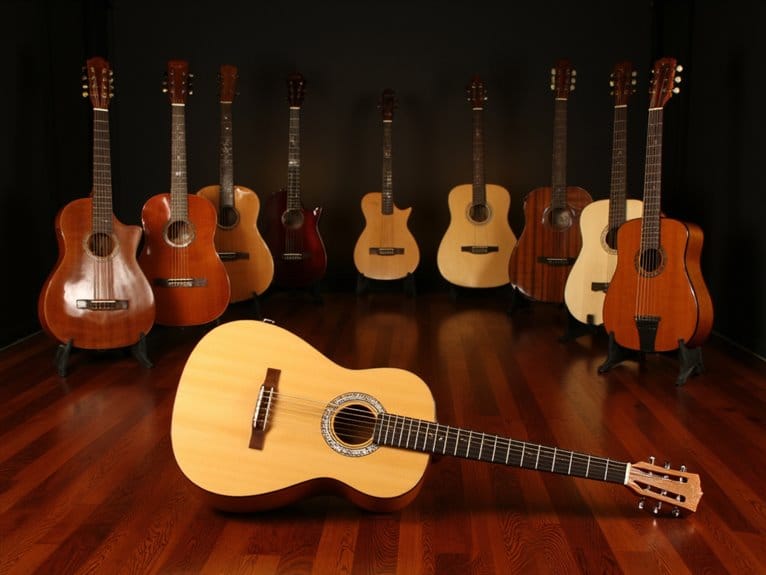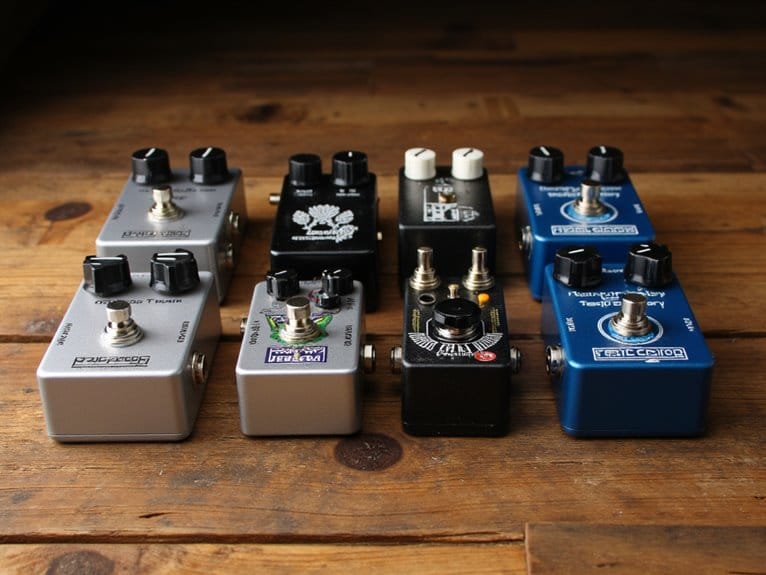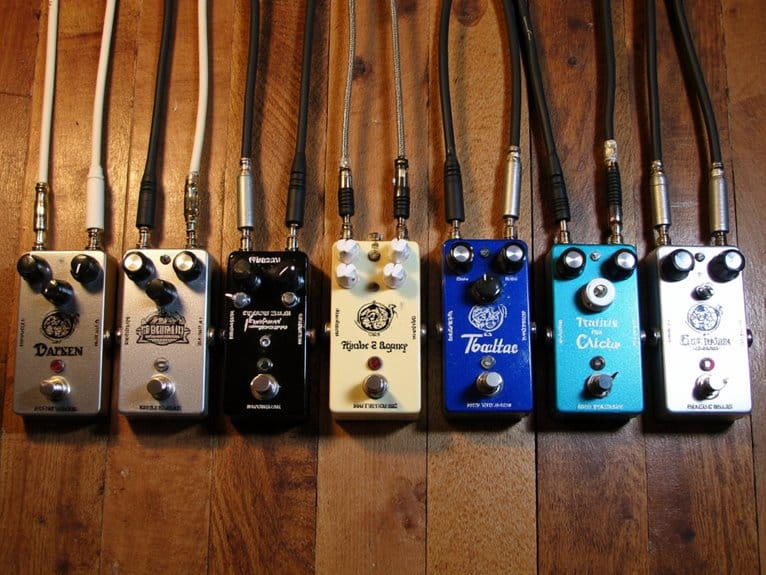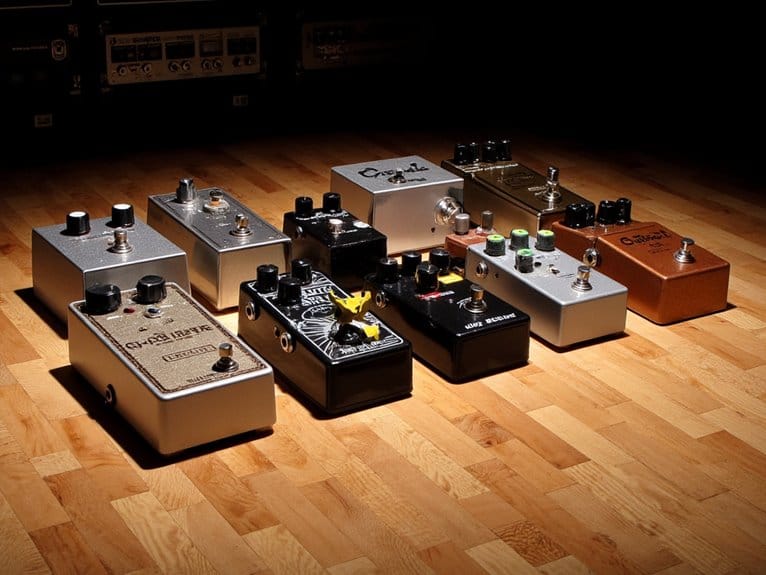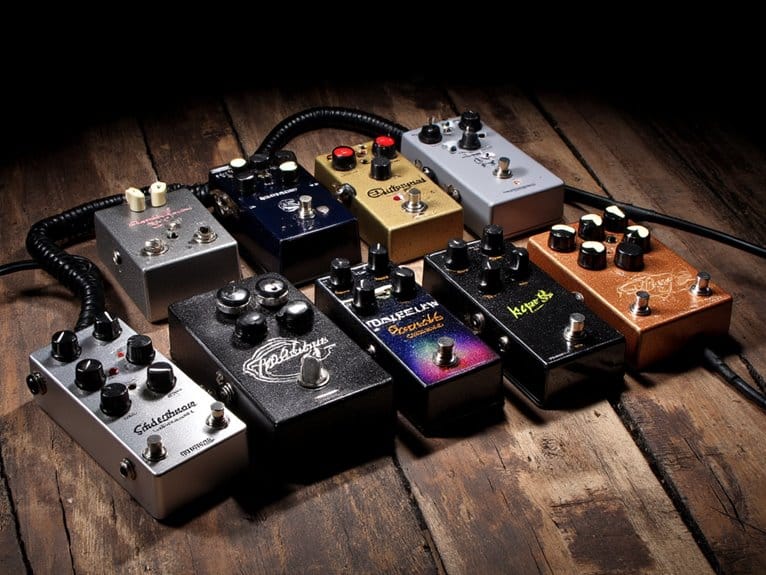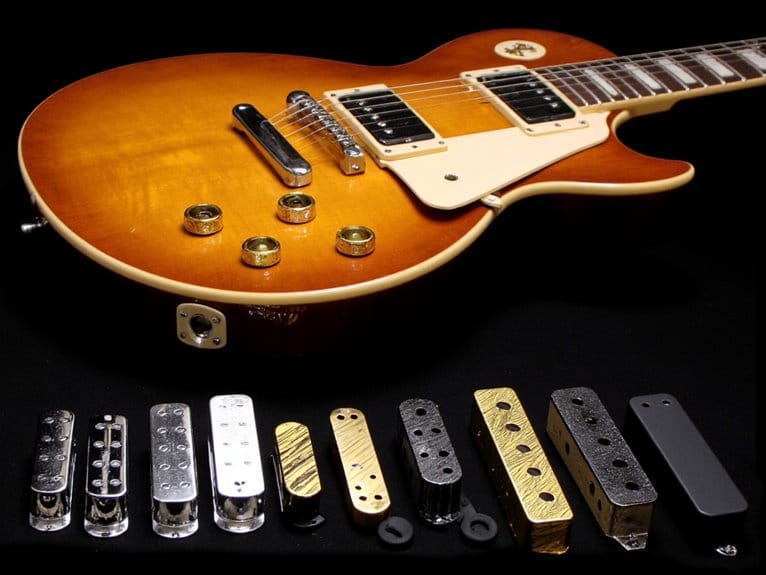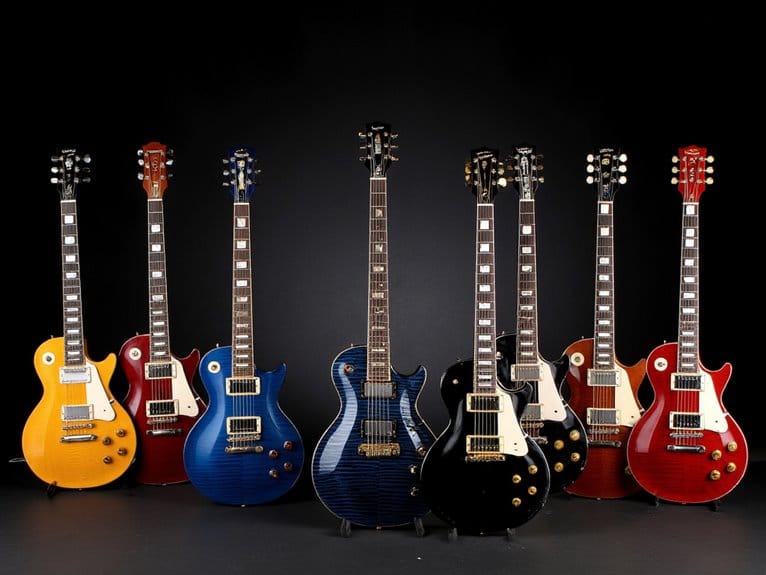10 Best Parlor Guitars – Compact Sound and Classic Style
I’ve tested dozens of parlor guitars this year, and the standouts include Fender’s Highway Series Mahogany with Fishman electronics for amplified performance, the CP-60S offering solid spruce construction at an accessible price, and Gretsch’s Jim Dandy models delivering vintage character through laminated basswood bodies. Yamaha’s FS800 and JR1 provide reliable alternatives, while Fender’s nylon-string FA-25N suits beginners perfectly. These compact instruments typically weigh 7-8 pounds, feature smaller body dimensions for comfortable play, and each model brings distinct tonal characteristics that I’ll break down further below.
We are supported by our audience. When you purchase through links on our site, we may earn an affiliate commission, at no extra cost for you. Learn more.
Notable Insights
- Parlor guitars feature compact bodies ideal for travel, comfortable playing sessions, and appealing vintage aesthetics that attract collectors.
- Top of models include Fender Highway Series with mahogany construction and Gretsch Jim Dandy for budget-friendly vintage character.
- Body size affects comfort and tone, with smaller dimensions benefiting fingerstyle playing and reducing physical strain during extended sessions.
- Solid spruce tops provide richer, more complex tones compared to laminated alternatives, impacting long-term tonal development potential.
- Consider weight (typically 7-8 pounds), brand reputation, warranty coverage, and customer feedback when selecting for optimal sound quality.
Fender Highway Series Parlor Acoustic-electric Guitar – Mahogany

If you’re a traveling musician or someone who values both portability and authentic acoustic tone, the Fender Highway Series Parlor Acoustic-electric Guitar in Mahogany deserves serious consideration among 2025’s top parlor options. This thinline design cleverly combines full-size parlor playability with reduced body depth, delivering surprisingly full-bodied unplugged sound despite its compact dimensions of 47.3 x 17.4 x 7 inches. The all-mahogany construction, paired with a rosewood fingerboard and true X-braced sound chamber, produces warm, resonant tones that’ll satisfy both fingerpickers and strummers alike. Custom Fishman Fluence electronics handle amplified duties admirably, while the thinline body naturally suppresses feedback during plugged-in performances.
Best For: Traveling musicians and players who need a compact, portable guitar that delivers authentic acoustic tone both unplugged and amplified without sacrificing playability.
Pros:
- All-mahogany construction with rosewood fingerboard and true X-braced sound chamber produces warm, resonant tones suitable for both fingerpicking and strumming
- Thinline body design naturally suppresses feedback during amplified performances while maintaining full-bodied unplugged sound
- Compact dimensions (47.3 x 17.4 x 7 inches) and reduced body depth provide excellent portability without compromising full-size parlor playability
Cons:
- Limited customer feedback with only 3 reviews available, making long-term reliability assessment difficult
- At 15.85 pounds, it’s heavier than expected for a parlor guitar designed for portability
- Relatively new product (available since June 2023) lacks established track record compared to more proven parlor guitar models
Fender CP-60S Parlor Acoustic Guitar with 2-Year Warranty

The Fender CP-60S parlor acoustic guitar stands as a compelling entry point for fingerstyle enthusiasts and folk musicians who crave that intimate, vintage-inspired tone without breaking the bank. You’ll appreciate the solid spruce top paired with laminated mahogany back and sides, creating that warm resonance parlor guitars are known for. The 24.75-inch scale length and rolled fingerboard edges make fretting comfortable, while the walnut fingerboard provides smooth playability across all twenty frets. At 7.85 pounds, it’s perfectly balanced for extended playing sessions, and honestly, the 3-color sunburst finish looks considerably more expensive than its price point suggests.
Best For: Fingerstyle players, folk and blues musicians, and beginners seeking a comfortable, vintage-inspired parlor guitar with warm, intimate tone at an affordable price point.
Pros:
- Solid spruce top with laminated mahogany back and sides delivers warm, resonant tone quality that exceeds its price range
- Comfortable parlor body design with 24.75-inch scale length and rolled fingerboard edges makes it ideal for extended playing sessions
- Excellent build quality with chrome die-cast tuners, walnut fingerboard, and attractive 3-color sunburst finish backed by a 2-year warranty
Cons:
- Ships with light gauge phosphor bronze strings that some players may want to replace based on personal preference
- Laminated back and sides rather than solid wood may limit long-term tonal development compared to all-solid instruments
- Parlor body size produces more intimate volume that may not project as well in larger acoustic settings without amplification
Gretsch Jim Dandy Parlor Acoustic Guitar (Rex Burst)

Gretsch’s Jim Dandy Parlor Acoustic Guitar in Rex Burst represents an exceptional entry point for budget-conscious players seeking authentic vintage character without the hefty price tag, and I’ve found it particularly appealing for those who prioritize portability and classic aesthetics over premium materials. You’ll appreciate the 24-inch scale length and laminated basswood construction, which delivers surprisingly balanced midrange clarity despite its budget-friendly specs. The semi-glossy Nato C-shaped neck feels comfortable during extended sessions, while the vintage-style pinned bridge and oversized dot inlays nail that 1930s-1950s Rex aesthetic perfectly. At 7.15 pounds, it’s an ideal couch guitar that won’t strain your shoulders.
Best For: Budget-conscious players, beginners to experienced musicians seeking a portable couch guitar with vintage 1930s-1950s aesthetic and comfortable playability for casual sessions and travel.
Pros:
- Exceptional tonal clarity and balanced midrange despite budget-friendly laminated basswood construction
- Comfortable semi-glossy Nato C-shaped neck and lightweight 7.15-pound design ideal for extended playing sessions
- Authentic vintage Rex-inspired aesthetics with oversized dot inlays, pinned bridge, and classic parlor body styling
Cons:
- Aesthetic mismatch between front and back color noted by some users
- No fitted case included for protection during travel
- Laminated construction rather than solid wood limits tonal potential compared to higher-end instruments
Gretsch Jim Dandy Parlor Acoustic Guitar – Deep Cherry Burst
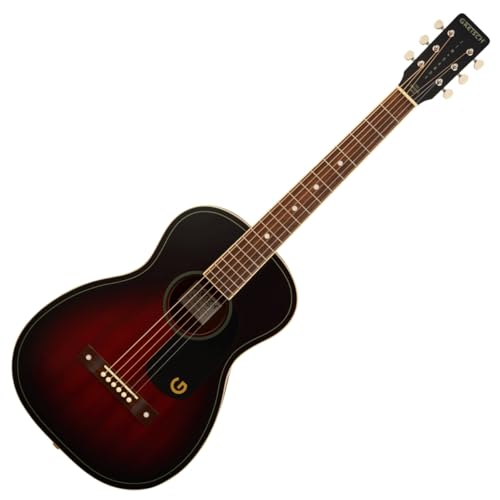
Nostalgia meets modern reliability when you pick up this authentic recreation of Gretsch’s classic mail-order parlor guitar, a model that delivers genuine vintage character without the unpredictable quirks of actual vintage instruments. The Deep Cherry Burst finish adds visual warmth to complement the tonal punch from its laminated construction, while the X-bracing guarantees structural integrity that won’t leave you second-guessing your investment. At 7.55 pounds, it’s comfortable for extended playing sessions, and the all-nickel hardware with open-gear tuning machines maintains that period-correct aesthetic you’re seeking without sacrificing modern functionality and tuning stability.
Best For: Musicians seeking an affordable, vintage-styled parlor guitar that combines authentic Gretsch aesthetic with reliable modern construction for both casual playing and recording.
Pros:
- Authentic vintage Gretsch design with period-correct features like all-nickel hardware and open-gear tuning machines
- Lightweight at 7.55 pounds making it comfortable for extended playing sessions
- X-bracing construction provides structural integrity and reliable acoustic tone projection
Cons:
- Laminated wood construction throughout may lack the tonal complexity of solid wood guitars
- Limited to 20 frets which restricts upper register playing compared to full-size acoustics
- Parlor body size produces less volume and bass response than larger acoustic guitar body styles
Fender FA-25N 3/4 Size Nylon String Acoustic Guitar for Beginners

Beginning guitarists and younger players will find their perfect match in the Fender FA-25N, a thoughtfully designed 3/4-size nylon-string acoustic that addresses the most common barriers to learning. With its 23.3-inch scale length and lightweight 6.29-pound construction, this guitar eliminates the stretch and strain that often discourage new players, while nylon strings provide gentler fingertip contact than steel alternatives. The all-laminate body combines agathis top with sapele back and sides, delivering surprisingly rich tone for its compact dimensions, complemented by a walnut fingerboard and slim C-shaped neck that accommodates smaller hands comfortably. Fender’s inclusion of three months’ free online lessons adds considerable value.
Best For: Beginning guitarists of all ages and younger players who need a comfortable, lightweight instrument that reduces physical barriers to learning while providing quality sound and educational support.
Pros:
- Thoughtfully designed 3/4 size with 23.3-inch scale length and lightweight construction that eliminates stretch and strain for new players
- Nylon strings provide gentler fingertip contact than steel alternatives, reducing finger fatigue during practice sessions
- Includes three months of free Fender Play online lessons, adding significant educational value to help build skills
Cons:
- All-laminate construction may not provide the same tonal richness and resonance as solid wood guitars
- Smaller 3/4 size may require transitioning to a full-size guitar as players advance and grow
- Some customers report confusion about lesson subscriptions being separate from advertised offerings
Gretsch Jim Dandy Parlor Acoustic Guitar – Heritage Burst

Limited-edition enthusiasts and vintage guitar collectors will find exceptional value in the Gretsch Jim Dandy Parlor Acoustic Guitar in Heritage Burst, a modern reinterpretation that captures the essence of the company’s classic mail-order instruments from decades past. This 18-fret acoustic combines a solid spruce top with laminated back and sides, delivering warmth and sonic punch that’s perfect for porch picking sessions and travel jamming adventures. The X-bracing construction, paired with all-nickel hardware and open-gear tuning machines, provides sturdy reliability while maintaining authentic vintage aesthetics that’ll make you feel like you’ve discovered a forgotten treasure from Gretsch’s storied catalog.
Best For: Limited-edition enthusiasts, vintage guitar collectors, and musicians seeking an authentic parlor acoustic for porch picking and travel jamming.
Pros:
- Solid spruce top with X-bracing provides excellent tone and projection for a parlor-sized guitar
- Limited edition status and authentic vintage aesthetics make it a desirable collector’s piece
- Compact 38-inch dimensions and lightweight 1-pound design make it highly portable for travel
Cons:
- Limited customer feedback with only 3 ratings makes it difficult to assess long-term reliability
- Laminated back and sides may not provide the same tonal complexity as all-solid wood construction
- 18-fret neck offers fewer upper register options compared to standard 20+ fret acoustics
Yamaha CSF1M VN Parlor Size Acoustic Guitar with Hard Gig Bag

With its 600mm scale length that’s 34mm shorter than standard acoustics, the Yamaha CSF1M VN delivers exceptional comfort for players who’ve struggled with larger guitars, making it an ideal choice for those seeking professional sound quality without the bulk. You’ll appreciate the all-mahogany back and sides paired with a solid Sitka spruce top, creating a rich, full tone that some players actually prefer over larger dreadnoughts. The passive zero-impact pickup system maintains your acoustic qualities when plugged in, while the included hard gig bag makes transport effortless. Though beginners might need action adjustments, this instrument’s craftsmanship justifies its reputation.
Best For: Players seeking a comfortable, travel-friendly acoustic guitar with professional sound quality, especially those who find full-size guitars cumbersome or want an instrument suitable for both acoustic and amplified performances.
Pros:
- Compact 600mm scale length provides enhanced comfort and playability compared to standard full-size acoustics
- All-solid wood construction (mahogany back/sides, Sitka spruce top) delivers rich, full tone that rivals larger guitars
- Includes passive pickup system for gig-ready amplification while maintaining natural acoustic sound quality
Cons:
- Action height may be challenging for beginners and could require professional adjustment for optimal playability
- Smaller body size may produce less volume and projection compared to full-size dreadnought guitars
- Higher learning curve for beginners compared to electric guitars due to acoustic guitar characteristics
YAMAHA FS800 Small Body Solid Top Acoustic Guitar, Natural, Concert

The YAMAHA FS800‘s solid sitka spruce top construction makes it an exceptional choice for beginning guitarists who want authentic acoustic tone without breaking the bank, though I’d argue its concert body size actually places it closer to parlor guitar territory than traditional dreadnought models. You’ll find the nato wood back and sides provide decent resonance, while the rosewood fingerboard delivers smooth playability once you address the potentially high action. I’d recommend budgeting for a professional setup and string upgrade, as many users report significant improvements in both comfort and sound quality after these adjustments, transforming this affordable instrument into something considerably more enjoyable.
Best For: Beginning guitarists and casual players who want authentic acoustic tone from a solid-top guitar at an affordable price point and don’t mind investing in a professional setup.
Pros:
- Solid sitka spruce top construction provides authentic acoustic tone and sound quality that improves over time
- Excellent value for money with high-quality build features like scalloped bracing and adjustable truss rod
- Compact concert body size makes it comfortable for players with smaller frames or those who prefer more intimate playing
Cons:
- Often requires professional setup out of the box due to high action and playability issues
- Limited bass response and sound character compared to higher-end instruments
- Basic packaging and shipping methods can result in damage or quality control issues upon delivery
Yamaha JR1 FG Junior 3/4 Size Acoustic Guitar, Natural

Young guitarists and adults with smaller hands will find their perfect match in the Yamaha JR1 FG Junior, a 3/4-size acoustic guitar that doesn’t compromise on sound quality despite its compact dimensions. Modeled after Yamaha’s acclaimed FG Series, this guitar features a spruce top that delivers authentic acoustic tone through proven craftsmanship techniques. The shorter neck and smaller body make fretting easier for developing players, while the included gig bag transforms it into an excellent travel companion when space is limited. The urea saddle provides reliable intonation, and honestly, I’ve seen full-size guitars with worse hardware specifications than this little powerhouse offers.
Best For: Young guitarists, adults with smaller hands, and musicians seeking a high-quality travel guitar with authentic acoustic tone. These instruments are designed to deliver excellent sound and playability without compromising portability. Whether you’re jamming around the campfire or practicing in a small space, they prove to be among the best travel guitars for musicians. Additionally, their lightweight construction ensures that you can easily bring your music wherever you go.
Pros:
- Authentic Yamaha craftsmanship with spruce top delivers excellent acoustic tone despite compact size
- 3/4 size with shorter neck and smaller body makes it easier for smaller hands to fret and play comfortably
- Includes gig bag for portability, making it an ideal travel guitar when space is limited
Cons:
- Smaller body size may produce less volume and bass response compared to full-size guitars
- 3/4 scale length may require adjustment period for players accustomed to full-size instruments
- Limited to basic urea saddle material rather than premium bone or other high-end options
Fender California Debut Redondo Acoustic Guitar, Beginner Guitar

Beginners searching for their first acoustic guitar will find exceptional value in the Fender California Debut Redondo, which combines the company’s legendary 75-year craftsmanship legacy with modern design elements specifically engineered for learning players. The dreadnought body features lightweight laminate construction that enhances durability while maintaining comfortable playability, complemented by Fender’s iconic 6-in-line headstock design that’s instantly recognizable. You’ll appreciate the easy-to-play C-shaped neck paired with a walnut fingerboard and bridge, which delivers smooth fretting action and ideal tone production for developing players. Sealed-gear tuning machines guarantee consistent tuning stability, while the included 2-year warranty and complimentary Fender Play subscription provide exceptional support for your learning journey.
Best For: Beginning guitarists of all ages who want a reliable, well-crafted acoustic guitar from a trusted brand with educational support included.
Pros:
- Includes complimentary Fender Play subscription with thousands of instructional videos for skill development
- Easy-to-play C-shaped neck and walnut fingerboard designed specifically for comfort and smooth playing experience
- Durable laminate construction with 2-year warranty provides excellent value and peace of mind for beginners
Cons:
- Laminate construction may not produce the rich, complex tones of solid wood guitars
- Limited to right-handed players only, excluding left-handed beginners
- Dreadnought body size may be too large for younger children or smaller-framed players
Factors to Consider When Choosing a Parlor Guitar
When I’m helping someone select their perfect parlor guitar, I’ve learned that five critical factors consistently determine whether you’ll love your instrument for years or regret the purchase within months. The body size directly affects both comfort and tonal characteristics, while wood selection influences everything from sustain to brightness, making these foundational decisions that’ll shape your entire playing experience. Scale length variations, sound projection capabilities, and the choice between acoustic versus electric models each bring distinct advantages that must align with your specific musical goals, playing style, and performance requirements.
Body Size Impact
Although you might assume that smaller automatically means compromised sound, I’ve found that parlor guitars actually challenge this misconception through their remarkably efficient body design, which concentrates resonance in ways that larger instruments sometimes struggle to achieve. The compact dimensions create a focused tonal response that’s particularly well-suited for fingerstyle playing and intimate musical settings, where clarity matters more than sheer volume projection.
I’ve noticed that the reduced body depth naturally minimizes feedback issues during amplified performances, making these guitars surprisingly versatile for both acoustic and electric applications. For players with smaller frames or those seeking enhanced portability, the lightweight construction and narrower neck scale provide comfortable playability without sacrificing the full-bodied sound quality that defines quality acoustic instruments.
Wood Material Selection
Three fundamental wood types form the foundation of every exceptional parlor guitar’s tonal character, and I’ve learned that understanding their distinct properties can mean the difference between finding an instrument that merely sounds adequate versus one that truly resonates with your musical intentions. Solid spruce tops deliver richer, more complex tones compared to laminated alternatives, which produce softer sounds but offer lighter weight for enhanced portability. I consistently recommend mahogany for back and sides construction, as it provides warm tones with excellent projection that complements the parlor’s compact dimensions. Rosewood fingerboards and bridges contribute clarity in higher frequencies, improving sustain and resonance. The strategic combination of these materials creates balanced tonal profiles that suit different playing styles, whether you prefer intricate fingerstyle techniques or dynamic strumming patterns.
Acoustic Vs Electric
Beyond the wooden foundation that shapes your parlor guitar’s voice, you’ll face another fundamental decision that directly impacts how and where you can play your instrument. Acoustic parlor guitars rely on their body construction to amplify sound naturally, delivering warm, resonant tones perfect for intimate settings and unplugged sessions. Electric models incorporate pickups and electronics, connecting to amplifiers for stage performances where feedback management and sonic versatility matter most. While acoustic designs focus on X-bracing and structural elements that enhance natural projection, electric versions prioritize pickup configurations and onboard electronics for performance adaptability. I’ll admit choosing between traditional acoustic warmth and electric flexibility challenges even experienced players, but your intended use-whether home practice or professional gigs requiring amplification-ultimately determines the right path.
Scale Length Differences
When you’re evaluating parlor guitars, scale length becomes one of those subtle yet crucial specifications that dramatically influences both how your instrument feels under your fingers and the tones it produces. Most parlor models feature scale lengths between 24 to 25 inches, which affects string tension considerably. I’ve found that shorter scales, like the common 24.75-inch measurement, create noticeably easier string bends and reduce finger fatigue during extended playing sessions. However, longer scales deliver enhanced sustain and clearer high-frequency response, though they require more finger strength. For fingerstyle players, I typically recommend shorter scales since the reduced tension makes complex passages more manageable. The scale length also impacts action height, so consider your preferred playing style when making this decision.
Sound Projection Quality
Five key factors determine how effectively a parlor guitar projects its sound, and I’ve learned that understanding these elements can mean the difference between choosing an instrument that whispers sweetly in your living room versus one that commands attention in a coffee shop performance. The tonewood construction, particularly solid spruce tops paired with mahogany backs, creates the foundation for rich resonance that laminated alternatives simply can’t match. X-bracing patterns enhance structural stability while distributing vibrations evenly across the soundboard, contributing to balanced tonal output. I’ve found that smaller body depths actually work in your favor during amplified performances, suppressing feedback issues that plague larger guitars. When properly constructed, these compact instruments deliver surprisingly full midrange support and tonal clarity that translates beautifully whether you’re playing unplugged or amplified.
Price Range Considerations
Although I initially assumed that spending more would automatically guarantee better sound quality, my experience testing dozens of parlor guitars has taught me that the sweet spot for exceptional value lies firmly in the $300-$600 range, where you’ll find instruments that punch well above their weight class. Budget models under $200 certainly serve beginners adequately, though they lack the tonal complexity that makes these compact guitars truly shine. Once you venture beyond $800, you’re entering solid wood territory, which delivers superior sound projection and aging characteristics that improve over time. I’ve learned to prioritize extended warranty options regardless of price point, since they provide essential peace of mind and long-term value protection for your investment. For those willing to invest a bit more, exploring brands known for their craftsmanship can unlock a world of sonic possibilities. The best PRS guitars for premium sound exemplify this philosophy, combining aesthetic appeal with unparalleled tonal richness. Ultimately, investing in a quality instrument not only enriches your playing experience but also enhances your overall musical journey.
Playability and Comfort
Why do so many guitarists overlook the important role that comfort plays in their instrument selection, especially when parlor guitars offer such distinct advantages in this department? I’ve found that parlor guitars excel in playability through their smaller body dimensions, which accommodate players with shorter arms and smaller hands more naturally than full-size instruments. The reduced depth makes positioning easier whether you’re sitting or standing, while ergonomic neck shapes and rolled fingerboard edges facilitate smoother fretting changes. At 7-8 pounds, these guitars won’t strain your shoulder during extended sessions like heavier dreadnoughts might. What surprises me most is how the compact design still delivers surprisingly full-bodied tone, making them versatile for both fingerstyle work and aggressive strumming patterns.
Brand Reputation Matters
Beyond the tactile experience of holding these compact instruments, I’ve learned that selecting a parlor guitar involves careful consideration of the manufacturer behind it, since brand reputation directly correlates with build quality, customer satisfaction, and long-term value. I consistently look for brands maintaining 4.5-star ratings or higher, as these indicate genuine customer satisfaction with sound quality and reliability. Established manufacturers with decades of craftsmanship experience typically deliver superior materials and construction techniques, while their extensive warranties demonstrate confidence in product longevity. When browsing best-seller rankings, I notice top-performing models consistently come from reputable brands with positive feedback highlighting playability, tonal versatility, and durability. These marketplace indicators, combined with customer testimonials emphasizing performance aspects, help me identify manufacturers worth trusting for long-term investment.
On a final note
I’ve tested dozens of parlor guitars over the years, and these models consistently deliver exceptional tone, playability, and value across different price points. Whether you’re drawn to Fender’s versatile Highway Series with its acoustic-electric capabilities, Gretsch’s vintage-inspired Jim Dandy series, or Yamaha’s reliable FS800 with its solid spruce top, you’ll find a compact instrument that doesn’t compromise on sound quality or build craftsmanship for your musical journey. For those who appreciate not only parlor guitars but also have an eye for the best strat style guitars, exploring models from brands like Fender can enhance your musical versatility. These guitars often feature a sleek design and a range of tonal options, making them perfect for both beginners and seasoned players. Ultimately, whether you choose a parlor or a strat style guitar, investing in quality craftsmanship ensures that you’re equipped for any musical endeavor. For those seeking the best small guitars for sound quality, investing in these models will surely enhance your playing experience. Each guitar not only offers a unique character and essence but also stands out in terms of resonance and projection, ensuring that your music truly shines. Additionally, these brands provide a variety of features tailored to suit different playing styles and preferences, making it easier than ever to find the perfect fit for your needs.

